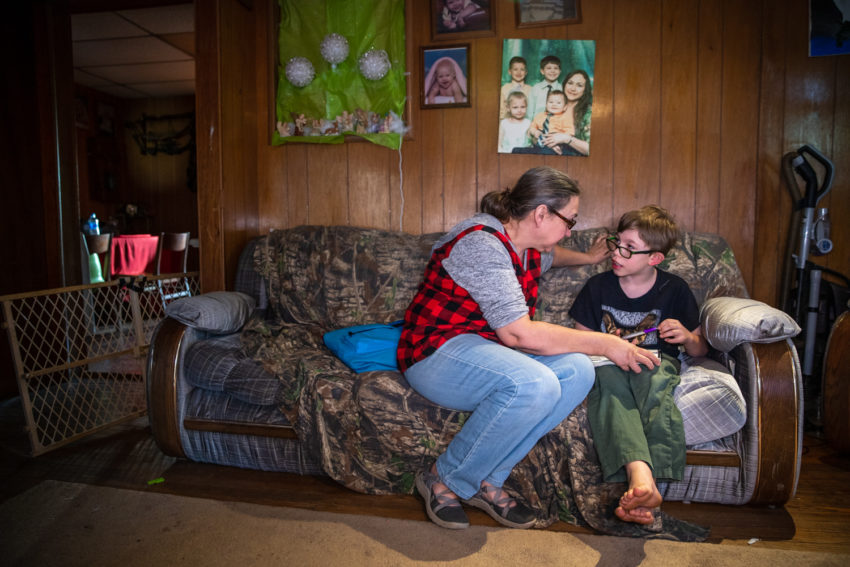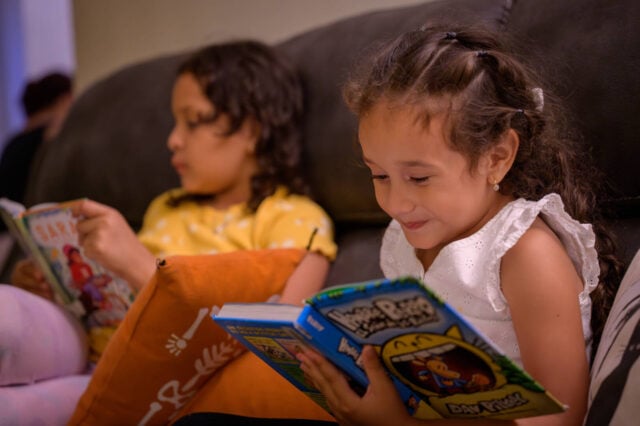Shock.
That’s how Lucy, 58, describes her reaction when a West Virginia judge so quickly gave her custody of her brother’s three young children in 2016. Lucy thought she would have more time to prepare herself as well as her home if the judge decided to place the children with her, but it instead became a sudden, decisive action that changed the course of her family’s life.
Lucy now faced the reality of accommodating Dakota, Bridgett, and Mackenzie by stringent state standards and on a deadline. She knew it was the right thing to do but wasn’t sure how she would get her home ready. This was her time of greatest need.
“It was like confusion,” Lucy says. “I was distraught. These little kids are dependent on me. I don’t even know how to explain the feeling. How am I going to get this done and get it approved so they can stay? There was no other option for ‘em.”
Caring for others
Lucy exudes patience, intelligence, and humility. She had spent 25 years raising four children while building a career as the director of a psychiatric care unit. She had also previously adopted two of her grandchildren when her daughter died in a car accident in 2005.
“The accident in 2005 was another game changer,” Lucy says. “It destroyed me career-wise. I lost focus. You can’t counsel people when you can’t help yourself.”
But she didn’t lose hope, and despite health scares and financial struggles, she was able to go on and raise the children, and they’re now mostly self-sufficient. She also eventually began working for the state’s Department of Health and Human Resources, providing family preservation and reunification services. And later she would adopt three other children needing a home.
Through all of these personal and professional experiences, she had seen many families in this part of United States struggle with the physical, social, mental, and emotional effects of high unemployment and widespread drug abuse. Children often suffer the most — lacking adequate food and nutrition, structure and routine, and love and nurture from family members. Lucy’s brother and the mother of Dakota, Bridgett, and Mackenzie had lost custody because drug addiction had overtaken their lives. The children had lived in chaos, and Dakota, the oldest, had extreme behavioral issues, which Lucy says his teachers compared to that of animals.
Lucy has a gift for providing tender care to fragile people. That proves essential in raising children from difficult backgrounds and in her work helping people recover from addiction and traumatic situations. So when the judge granted her custody of her brother’s children, she was willing to help and knew she was the kids’ only good option.
A helping hand
After the custody hearing and with state deadlines looming to get her house ready for three children, she was nervous. But that’s when her church family and World Vision came to help.
She connected with staff at World Vision’s essential supplies and building materials center in Philippi, West Virginia. Lucy needed to create bedroom spaces for the kids. World Vision provided insulation, windows, doors, vinyl flooring, a sink, a toilet, and a refrigerator.
“If it hadn’t been for (site manager) Dave Leach, I wouldn’t have been able to take them in,” Lucy says. “I appreciate everything World Vision has done. I really do. That was a major factor in me being able to take the kids in and keep them.”
As Lucy made more room in her heart for these vulnerable children, the provision of products diminished her stress and made room in her life and finances for her to focus on loving them with nutritious food, quality time, and motherly care.
A transformation
Since receiving that help in 2016, the burden of raising more children than she planned has lessened.
Lucy’s life isn’t easy, she says. She wakes up at 5:30 a.m. every day to get kids off to school and daycare. She then works 10 hours a day, makes dinner, and patiently helps the children with schoolwork. And then it’s bath time for the kids, and she has to get them to bed. But she’s hopeful for the kids because she has seen profound changes in them.
Dakota has grown immensely and can now sit calmly while Lucy helps him with his homework. He trusts her. Her attentiveness helps him focus and stay interested in his tasks. He relies on her for help with words or concepts. She provides the stability he desperately needs. This embodies the power of adoption to bring new life. Human adoption is a symbol of what God did for all people through Jesus Christ (Galatians 4:4-5).
“It’s really been a challenge,” she says. “But the transformation has been amazing.”
Lucy says they’re still in the middle of the struggle. But this humble, patient, and hard-working mother and her children are able to take each day as it comes, in part because of a community of neighbors and donors is willing to come around them in their time of need.
“We’re just going forward,” Lucy says. “It’s not the best in the world, but it’s home.”


